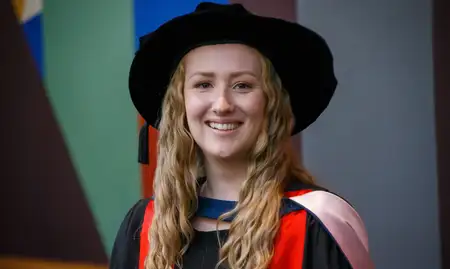
Dr Clare Ladyman.
PhD graduate Dr Clare Ladyman’s research showed that poor sleep is related to perinatal depression, with severe and long-lasting outcomes for mother and child.
Over 18 per cent of New Zealand women experience depressive symptoms during pregnancy. With approximately 60,000 births every year, that equates to nearly 10,000 women who have their health comprised because of antenatal depression.
“The relationship between poor sleep and depression is bi-directional. Poor sleep increases the risk of depression and depression is associated with poor sleep, which is a cycle that can be challenging to break,” Dr Ladyman says.
The mother of two spent years working in corporate affairs roles before taking time off to grow her family, so when her sons began school she decided it was time for a change. She enrolled to complete postgraduate studies in sleep science at the University of Western Australia, but when her husband was offered work in Wellington, they relocated from Perth.
Dr Ladyman was delighted to find that Massey University was the home of the Sleep/Wake Research Centre.
“I went and spoke to the staff there, and found out that quite serendipitously, there was a PhD scholarship available on the exact project I had been considering.”
Four years on, Dr Ladyman has graduated with a Doctor of Philosophy (Behavioural Sleep Science) and says the most rewarding part of her work has been helping mothers get a good night's sleep in attempts to lower the risk of mothers experiencing mental health issues.
“The title of my thesis, 'I could cope so much better if I could just get a good night’s sleep', is what I used to hear from most of my friends as we were raising our children and is what led me into this research,” she says.
Dr Ladyman completed three projects, including a review of sleep health in pregnancy, analysis of long-term perinatal depression patterns, and the trial of a sleep education intervention in pregnancy for women with a history of depression.
“The findings from my research highlighted the strong relationship between sleep and maternal mental health and that providing women with sleep education and strategies for improving sleep can minimise depressive symptoms and improve sleep, without the need for medication.”
Something that surprised Dr Ladyman during her research was how strong the relationship between perinatal sleep and depression is and the enduring nature of poor mental health on women up to three years post birth.
“For example, if a women is experiencing depression in late pregnancy then they have an 83 per cent likelihood of experiencing it three years later. And if the mother is Māori, then this likelihood increases to 98 per cent. These figures are alarmingly high! What’s more, these high depression patterns are also associated with having greater sleep disruption, poorer sleep quality and more difficulty getting to sleep.”
Back in 2020, Dr Ladyman won the Sleep Health Foundation of Australia and New Zealand’s Emerging Sleep Hero Award for her research on sleep in pregnancy. She developed a sleep education pregnancy intervention for women at risk of depression relapse, which showed promise for improving sleep and minimising depression.
This material was repackaged into a book and published by Massey University Press in 2020, titled Sleeping Better in Pregnancy.
Since completing her PhD, Dr Ladyman says she has been fortunate to be able to continue working with the Sleep/Wake Research Centre on a number of sleep and fatigue projects, both in the maternal sleep field but also in other interesting studies such as sleep and fatigue in helicopter and fixed wing pilots.
She also works for the University of Sydney as a sessional academic.
Related news
Highlighting narratives of an epidemic through the pandemic
Sexual violence has long been a growing epidemic in Aotearoa New Zealand but became exacerbated with the arrival of COVID-19, particularly for people within socially marginalised groups.

Smoosh – a flatpack shoe designed for a digital nomad lifestyle
Dr Magdalena Karasinska’s nomadic experience served as a valuable starting point for her creative and practice-led research PhD project called ‘Smoosh.’
